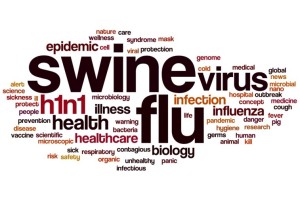Once again, there is panic all around. Myths galore and people are running confused, believing mail and WhatsApp forwards.
History:
- 2009 – First time evidence that h1n1 can affect humans & could cause death – declared pandemic by WHO
- June 2009, a total of 74 countries and territories had reported laboratory confirmed infections. To date, most countries in the world have confirmed infections from the new virus.
- The new virus has also led to patterns of death and illness not normally seen in influenza infections.
H1n1: few facts
- Most of the deaths caused by the pandemic influenza have occurred among younger people, including those who were otherwise healthy.
- Pregnant women, younger children and people of any age with certain chronic lung (COPD, asthma) or other medical conditions (diabetes) appear to be at higher risk of more complicated or severe illness.
How do people become infected with the virus?
- The H1N1 virus is spread from person to person, similar to other seasonal influenza viruses.
- It is transmitted as easily as the normal seasonal flu and can be passed to other people by exposure to infected droplets expelled by coughing or sneezing that can be inhaled, or that can contaminate hands or surfaces.
To prevent spread, people who are ill should
- Cover their mouth and nose when coughing or sneezing,
- Stay home when they are unwell,
- Clean their hands regularly, and
- Keep some distance from healthy people, as much as possible.
Signs of the h1n1 influenza are like any other flu
- Malaise (body ache),
- fever,
- cough,
- headache,
- muscle and joint pain,
- sore throat and
- severely running nose, and sometimes
- vomiting and diarrhoea.
Worrying signs (RUSH to the doctor; INFORM the doctor if already under treatment)
- Shortness of breath or difficulty breathing,
- Fever (esp. high fever) continues more than three days.
- Running nose like you have never had before!
How to ensure either not to contact or not to suffer?
Increase body immunity by
- 12 glasses of water
- 2 fruits/ day
- 1 serving of fresh salads daily
- Milk & curd daily
- 30 minute exercise daily
It is NOT that all who contact h1n1 will get hospitalized or turn critical
The majority of people with h1n1 influenza experience mild illness and recover fully without treatment.





Dear Doctor, Kindly let me know if there are any ‘preventive’ injections that are available for deterring the H1n1 virus? Thank you.
NO. Tanishq.
None yet. Although several cases have been reported, it is not a panic stage. Time to take due care.
Thank you Dr. I was highly concerned because parents are spending as high as Rs.9000/- for such injections. My question would be to the government if this were true that surely important vaccinations cannot be made out of reach of the common man. Are they and their children supposed to suffer while the others survive?
I admire doctors such as yourself who are able to guide us correctly. Thank you once again.